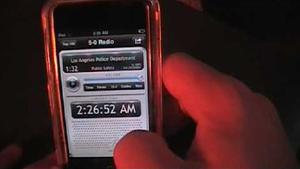Law enforcement technologyPolice uneasy about cheap smart-phone scanner app
Just a few years ago, someone wanting to listen to the dispatches of their local police department had to purchase and program special equipment; now, modern technology has made it possible to transform popular smart phones into personal police scanners; police say that criminals could use the increased accessibility provided by the new technologies as a tool for committing crimes

App turns smart phones into police scanners // Source: wn.com
Just a few years ago, someone wanting to listen to the dispatches of their local police department had to purchase and program special equipment. Now, modern technology has made it possible to transform popular smart phones into personal police scanners.
Several applications that can be downloaded for little to no cost on many mobile phones stream police dispatches directly to the device, making it possible for anyone with an iPhone, Android or Blackberry to monitor police activity in real time.
The Baton Rouge Police Department learned in early February that its radio dispatches had become available to the public for free or at very low cost, and the discovery has top officials at the department alarmed, said Sgt. Donald Stone, a police spokesman.
Baton Rouge Police Chief Charles Mondrick said criminals could use the increased accessibility provided by the new technologies as a tool for committing crimes.
“I have no problem with law-abiding citizens monitoring police radio transmissions,” Mondrick said. “However, we have no way to separate the criminal, terrorist element from the good citizens.”
Mondrick said concerns for officer safety and homeland security led the department’s command staff and city-parish administrators to meet to discuss ways of limiting access to the radio dispatches.
2theadvocate reports that James Leung created one of the most popular scanner apps, 5-0 Radio, in October 2009. Leung said in an e-mail from his home in London that his app has been downloaded more than nine million times and currently gets about 150,000 new users each week. 5-0 Radio was the No. 5 top paid app overall in 2010, he said.
Leung explained his app uses volunteers with police scanner equipment who hook up the devices to a computer and upload their local police department’s stream to the app’s servers. The servers then distribute the streams to the app’s users.
Leung said none of the thousands of departments featured on the app have requested to be removed, but he would not hesitate to do so if asked.
“We take public safety seriously, and we will take off any communication that can pose a threat to it,” he said.
His app bans any tactical, narcotics, detectives, or SWAT communications from being available to its users, Leung said. What is left is the routine dispatches and talkgroups for law enforcement, he said.
Mondrick, though, said that the ease of access to even everyday police chatter is cause for concern.
Previously, those wanting to listen to Baton Rouge police dispatches had to buy a scanner, which can cost upward of $200, and have that scanner specifically programmed to pick up city-police transmissions, Stone said.
